Here is an example that uses \begin{anything} and \end{anything} for the beginning and ending regexp that is used by the function toggle-block to determine what two points to use to fold everything between those two points. The original poster could modify beg-flag-regexp to be something like function1\\|function2\\|function3\\|function4 and the ending regexp would be something like endfunction. The beginning point should probably be just after function1 so that function1 remains visible when the code block is folded. Additional tweaking / modification to this function would be needed to suit the precise needs of the original poster, but this example should help demonstrate the general concept behind using outline-flag-region from the outline library.
(defvar beg-flag-regexp (concat
"\\(\\\\begin\{\\)\\("
"[^}]*"
"\\)\\(\}\\)" )
"Regexp matching the beginning of the folded region.")
(defun toggle-block ()
"When FLAG is non-nil, hide the region. Otherwise make it visible. For this
function to work, the cursor must be on the same line as the beginning regexp."
(interactive)
(require 'outline)
(cond
((or
;; sweet-spot
(looking-at beg-flag-regexp)
;; point could be between backslash and before the letter n
(let ((line-begin (save-excursion (beginning-of-line 1) (point))))
(save-excursion
(re-search-backward "\\\\" line-begin t)
(looking-at beg-flag-regexp)))
;; point could be to the right of \begin
(let ((line-begin (save-excursion (beginning-of-line 1) (point))))
(save-excursion
(re-search-backward "\\\\begin" line-begin t)
(looking-at beg-flag-regexp)))
;; point could be to the left of \begin
(let ((line-end (save-excursion (end-of-line 1) (point))))
(save-excursion
(re-search-forward "\\\\begin" line-end t)
(backward-char 6)
(looking-at beg-flag-regexp))))
(let* (
(flag (not (get-char-property (match-end 0) 'invisible)))
(beg (match-end 0))
end
(base-flag-match (regexp-quote
(buffer-substring-no-properties (match-beginning 2) (match-end 2))))
(end-flag-match (concat "\\\\end\{" base-flag-match "\}"))
(go-fish (concat "\\begin\{" base-flag-match "\}")) )
(save-excursion
(if (re-search-forward end-flag-match nil t)
(progn
(setq end (point))
(outline-flag-region beg end flag)
(cond
(flag
(overlay-put (make-overlay beg end) 'display "\u25be"))
(t
(mapc 'delete-overlay (overlays-in beg end)))))
(user-error "Error locating an ending match for: %s." go-fish)))
(if (> (point) beg)
(goto-char beg)) ))
(t
(message "Sorry, you are not on a line containing the beginning regexp."))))
Step One: Paste the entire code for the variable beg-flag-regexp and the function toggle-block into the .emacs file, and restart Emacs.
Step Two: Open up an empty buffer, and type M-x text-mode RET
Step Three: Copy and paste the following examples into the buffer you just created:
\begin{wisemonkey}Lorem ipsum dolor sit amet, consectetur adipiscing elit. Vivamus convallis sodales sapien, ut vulputate tellus mollis vel. Aenean accumsan leo est, nec euismod sem imperdiet blandit. In sed consequat mi, in convallis arcu. Vestibulum ultrices lectus nec nisi malesuada hendrerit. Proin molestie placerat rutrum. Donec gravida, ligula sit amet luctus interdum, nisl quam tempus sem, eget varius lacus orci ac sapien. Nulla in metus non neque condimentum blandit. Phasellus sed est a tellus fermentum viverra vulputate non dui. Integer vel tempor nisi. Phasellus turpis lectus, gravida sit amet ornare faucibus, sollicitudin quis metus.
Pellentesque habitant morbi tristique senectus et netus et malesuada fames ac turpis egestas. Sed hendrerit commodo consectetur. Mauris sollicitudin ut sapien a interdum. Maecenas ac nibh sodales, adipiscing leo a, dictum turpis. Sed vestibulum odio id pulvinar rhoncus. Ut fringilla lacus at egestas semper. Nulla aliquet eleifend quam, nec varius tortor tincidunt at. Donec non vehicula tortor, eu congue augue. Nulla a nisi hendrerit, tincidunt sapien eget, accumsan mauris. Cum sociis natoque penatibus et magnis dis parturient montes, nascetur ridiculus mus.\end{wisemonkey}
\begin{lawlist} Nunc sapien elit, gravida in felis non, volutpat lacinia quam. Nulla ut sagittis turpis. Curabitur faucibus ullamcorper felis, eget hendrerit dolor. Donec volutpat, nisi at condimentum posuere, nulla justo blandit tortor, a rhoncus odio augue id dolor. Praesent sit amet aliquam risus. Praesent odio velit, dignissim eget tincidunt nec, ultricies ut est. Morbi sit amet pellentesque ipsum. Ut vitae laoreet mauris. Donec lobortis auctor tortor, id faucibus urna luctus quis. Praesent vel sollicitudin mi. Sed neque mi, ultrices nec erat ut, congue convallis ante. Sed eu ipsum blandit, porttitor libero ac, volutpat est.
Phasellus gravida urna at ante pretium, sed interdum sem elementum. Maecenas congue purus nec aliquam lobortis. Praesent lacinia ac libero at eleifend. Mauris nec blandit ante. Integer accumsan et elit vitae scelerisque. Maecenas hendrerit, elit quis facilisis rhoncus, mi justo adipiscing erat, vitae pellentesque dui purus eu magna. Vestibulum tincidunt, lacus vitae molestie hendrerit, quam justo feugiat odio, eu ullamcorper risus sem vitae lacus. Vestibulum sit amet nunc in dolor placerat congue hendrerit vel augue. Vivamus ac odio ut purus malesuada gravida eget a dolor. Nullam sit amet nisi congue, lobortis lacus eu, varius ante. Donec vehicula lacinia elit ac condimentum. Aliquam egestas adipiscing orci in pharetra. Curabitur pulvinar tincidunt neque, non tempus nisi volutpat eget. Nulla tincidunt egestas libero, a pharetra orci ullamcorper fermentum. Nulla nec nunc nec urna semper tristique. Proin est dolor, sodales ut pretium eu, luctus a magna. \end{lawlist}
Step Four: To fold the text, place the cursor anywhere on the line of code containing \begin{wisemonkey} or \begin{lawlist} and type M-x toggle-block
Step Five: To unfold the text, simply repeat Step Four.

(source: lawlist.com)

(source: lawlist.com)

(source: lawlist.com)
EXAMPLE # 2
(defun wisemonkey ()
"When FLAG is non-nil, hide the region. Otherwise make it visible. For this
function to work, the cursor must be on the same line as the beginning regexp."
(interactive)
(require 'outline)
(cond
((let ((line-end (save-excursion (end-of-line 1) (point))))
(save-excursion
(beginning-of-line 1)
(re-search-forward "function" line-end t)))
(let* (
(beg (save-excursion (end-of-line 1) (point)))
(flag (not (get-char-property beg 'invisible)))
end
(end-flag-match "endfunction"))
(save-excursion
(if (re-search-forward end-flag-match nil t)
(progn
(setq end (point))
(outline-flag-region beg end flag)
(cond
(flag
(overlay-put (make-overlay beg end) 'display "\u25be"))
(t
(mapc 'delete-overlay (overlays-in beg end)))))
(user-error "Error locating an ending match for: `function`.")))
(if (> (point) beg)
(goto-char beg)) ))
(t
(message "Sorry, you are not on a line containing the beginning regexp."))))


